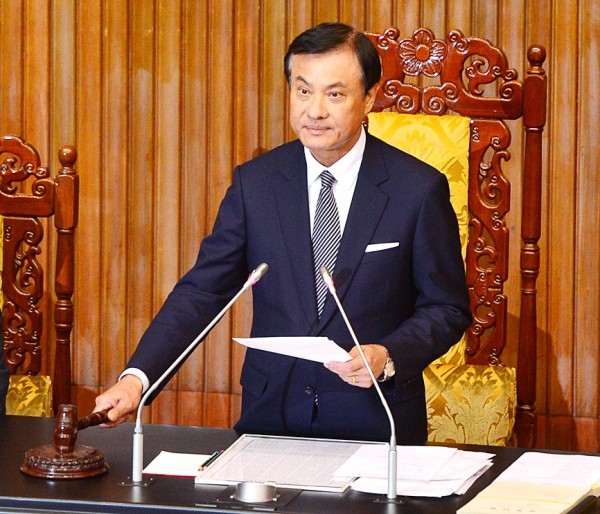《TAIPEI TIMES》 Referendum Act amendments approved

Legislative Speaker Su Jia-chyuan yesterday bangs his gavel in the Legislative Yuan in Taipei to mark the passage of amendments to the Referendum Act. Photo: Wang Yi-sung, Taipei Times
IN ABSENTIA: The amended act includes a provision allowing referendum signature drives to be conducted online, but absentee voting failed to obtain a majority vote
By Sean Lin / Staff reporter
Lawmakers yesterday approved amendments to the Referendum Act (公民投票法) to lower the legal voting age and slash the thresholds for initiating, seconding and passing referendums.
The Legislative Yuan yesterday reviewed several motions concerning seven disputed draft amendments.
A proposed amendment to Article 2, which states that issues stipulated in the Constitution — such as the nation’s official title and territory — are not to be decided through referendums, was passed with the support of the Democratic Progressive Party (DPP), the Chinese Nationalist Party (KMT) and the People First Party caucuses.
The New Power Party’s (NPP) motion to extend the scope of the act to cover the Constitution’s contents and to allow a new Constitution to be written was struck down.
The amended Article 2 also grants people the right to propose — through a referendum — laws to be considered by city or county councils, and to amend or abolish local government-level autonomous acts.
This is a step up from the former rule, which granted people the right to amend or abolish lower-level autonomous regulations, which do not need approval from city or county councils.
All four caucuses lent their support to a draft amendment of Article 7, which lowers the legal voting age for referendums from 20 to 18, allowing it to advance to the third reading without a vote.
The threshold for initiation of national and regional referendums has been lowered from 0.005 percent of the electorate in the most recent presidential election, or about 90,000, to 0.0001 percent, or about 1,800.
The number of signatures required for a proposed referendum to pass its second stage — 5 percent of all eligible voters in the most recent president election, or about 900,000 — has been reduced to 1.5 percent, or about 280,000.
The final-stage threshold, previously set at 50 percent of the electorate in the latest presidential election, was lowered to 25 percent, or about 4.5 million voters, with the number of people who vote “yes” to a referendum question required to surpass the number that voted against it for it to be approved.
A motion tabled by the KMT on Monday, which set the threshold at 20 percent, was vetoed.
A DPP motion to amend Article 13 to grant the Executive Yuan the right to propose referendums on major policies, proposing or vetoing a law was passed.
The amended act includes a new provision that allows signature drives, which are necessary for a referendum, to be conducted online.
According to the provision, the lead initiator of a referendum should request an authentication code when filing a request for an online signature drive with the Central Election Commission.
A KMT motion to implement absentee voting for referendums failed to obtain a majority vote.
A draft amendment by the NPP that seeks to have the president propose topics of “political negotiations” with Beijing as topics to be voted on in referendums before such negotiations are conducted was vetoed.
The DPP and the KMT said that such a regulatory measure should be stipulated in the proposed act on supervising cross-strait agreements, which the DPP has put on the back-burner to avoid worsening cross-strait ties.
NPP Executive Chairman Huang Kuo-chang (黃國昌) criticized the DPP over the outcome, saying its decision had forced President Tsai Ing-wen (蔡英文) to renege on a promise she made in 2011 during her first presidential election campaign to form a law on monitoring cross-strait political negotiations.
In response to the NPP’s proposals that the amendment should allow the public to vote on issues such as territorial changes and cross-strait negotiations, DPP spokeswoman Kolas Yotaka said those issues should be handled within the framework of the Constitution or a draft act on the cross-strait oversight mechanism.
While the KMT criticized the amendment for the exclusion of an absentee voting system, the DPP said it supports the idea of absentee voting and would legislate for its establishment with a separate law.
Additional reporting by Chen Wei-han
新聞來源:TAIPEI TIMES















